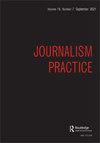Conversational Gatekeeping—Social Interactional Practices of Post-Publication Gatekeeping on Newspapers’ Facebook Pages
IF 2
2区 文学
Q2 COMMUNICATION
引用次数: 0
Abstract
ABSTRACT Digital platforms, such as social media networks, have become intertwined in the news ecosystem, leading news media to lose their role as the sole gatekeeper in the public space. This development has given an active voice to audiences and turned journalism more into conversations between journalists and their audiences. The starting observation for this article was that alongside journalists, platforms and audiences play a part in the gatekeeping process that takes place post-publication, and therefore we need to gain a better understanding of this triadic relationship. Furthermore, as conversations are one of the main functions of social media platforms, more understanding of the role of social interaction in post-publication gatekeeping is needed. After analysing posts (N = 180) and their comments on Finnish newspapers’ Facebook pages utilising content and digital conversation analysis, we extend the traditional gatekeeping theory to post-publication practices of gatekeeping and finally suggest the concept of conversational gatekeeping. The concept explains how through social interaction journalists and social media audiences are able to build mutual understanding and create norms as well as decide on the content and action that is appropriate or wanted in the public news space formed on the particular online platform.对话式把关--报纸 Facebook 页面上出版后把关的社会互动实践
摘要 社交媒体网络等数字平台已与新闻生态系统交织在一起,导致新闻媒体失去了其作为公共空间唯一守门人的角色。这一发展赋予了受众积极的话语权,使新闻报道更多地成为记者与受众之间的对话。本文的出发点是,除了记者,平台和受众在出版后的把关过程中也发挥着作用,因此我们需要更好地理解这种三方关系。此外,由于对话是社交媒体平台的主要功能之一,我们需要更多了解社交互动在出版后把关过程中的作用。在利用内容和数字对话分析对芬兰报纸的 Facebook 页面上的帖子(N = 180)及其评论进行分析后,我们将传统的把关理论扩展到了出版后的把关实践,并最终提出了对话把关的概念。这一概念解释了记者和社交媒体受众如何通过社交互动建立相互理解、创建规范,以及决定在特定网络平台上形成的公共新闻空间中适合或需要的内容和行动。
本文章由计算机程序翻译,如有差异,请以英文原文为准。
求助全文
约1分钟内获得全文
求助全文
来源期刊

Journalism Practice
COMMUNICATION-
CiteScore
5.50
自引率
14.30%
发文量
111
期刊介绍:
ournalism Practice provides opportunities for reflective, critical and research-based studies focused on the professional practice of journalism. The emphasis on journalism practice does not imply any false or intellectually disabling disconnect between theory and practice, but simply an assertion that Journalism Practice’s primary concern is to analyse and explore issues of practice and professional relevance. Journalism Practice is an intellectually rigorous journal with all contributions being refereed anonymously by acknowledged international experts in the field. An intellectually lively, but professionally experienced, Editorial Board with a wide-ranging experience of journalism practice advises and supports the Editor. Journalism Practice is devoted to: the study and analysis of significant issues arising from journalism as a field of professional practice; relevant developments in journalism training and education, as well as the construction of a reflective curriculum for journalism; analysis of journalism practice across the distinctive but converging media platforms of magazines, newspapers, online, radio and television; and the provision of a public space for practice-led, scholarly contributions from journalists as well as academics. Journalism Practice’s ambitious scope includes: the history of journalism practice; the professional practice of journalism; journalism training and education; journalism practice and new technology; journalism practice and ethics; and journalism practice and policy.
 求助内容:
求助内容: 应助结果提醒方式:
应助结果提醒方式:


